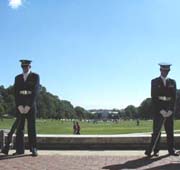| Schools' Sept. 11
Remembrances Marked by Caution, Concern for Students
 |
| Two Air Force ROTC cadets stand
on the edge of the University of Maryland's mall while a vigil marking
last year's terrorist attacks is held behind them. (Photo by Reginald
Hart / Maryland Newsline)
|
By
Etan Horowitz
Capital News Service
Tuesday, Sept. 10, 2002
WASHINGTON - Baltimore County school officials want their
students to remember the Sept. 11 attacks, not relive them.
So in most of the county's 162 public schools, television sets
will be silenced Wednesday. Instead of inundating students with repeated
footage of
planes crashing into the World Trade Center, teachers will read prepared
statements and most social studies classes will use the attacks as a
starting
point for the day's lesson.
It is one of a variety of approaches planned by schools across
the state
to mark the anniversary.
Drawing on a wealth of local and national resources on the
topic, some schools have planned elaborate assemblies lauding heroism and
patriotism while
others will mention the tragedy briefly and then go about business as
usual.
The Maryland State Department of Education has not mandated a
statewide curriculum for the day, but it has guidelines on its Web site for
teaching the
highly emotional subject. It advises educators to monitor their students'
feelings and behavior and provide appropriate counseling when necessary.
"Take time to listen to and talk with children about their
feelings," the
guide advises. "Reassure them that the school is a safe place to be."
Recognizing the range of emotions that will be stirred up, the
department
suggests teachers "be realistic about curriculum demands and assignments"
and
"be aware of and immediately stop all forms of bullying and harassment."
School officials say the tragedy should be addressed on an
age-appropriate
basis. Kindergarten and elementary school students, many of whom are not
old enough to vividly remember or understand what happened, will be
encouraged to focus on the unity and togetherness seen in the last year.
"We're not going to be talking about terrorists or anything
that will bring about fear in the children," said Michael Kline, principal
of the Ronald
McNair Elementary School in Germantown.
The Montgomery County school is planning an hour-long assembly
for grades
three through five that will include speeches by school and county officials
and
patriotic songs. Winners of an essay contest that asked students to define a
hero and an American will read their responses.
At Mount Savage School in Allegany County, about 30 miles from
where United Airlines Flight 93 crashed in a Pennsylvania field, all
students will observe a moment of silence in the morning, but only the
middle school students
will be required to have a Sept. 11-based lesson.
"Each teacher will develop their own plans, based on what they
know about
their kids," said Gary Llewellyn, the school's principal.
"Lesson plans will not focus on who's to blame, but more on
the effort to
support the families who were involved and understand the country's
reaction,"
he said.
Discussion of the event will be more fact-based and detailed
at the high
school level, school officials said.
At Perryville High School in Cecil County, all students will
see a multimedia presentation of events preceding and following the attacks.
Government classes will focus on the constitutional rights of individuals
held in connection with the attacks. World history teachers will give
background on the worldwide political impact of the event.
In recent weeks, there has been a lot of talk about how
teachers should address the issue of blame. While the U.S. government has
long said that Osama
bin Laden and al-Qaeda were behind the attacks, some educators are
concerned that a discussion about blame could lead to stereotyping and put
some
students in an uncomfortable situation.
"We allow for a variety of different viewpoints," said Charles
Herndon, a
Baltimore County schools spokesman. "I'm not sure blame is something we want
to assign, but we do want our students to consider issues raised by this day
and
come to their own conclusions."
Sue Mabry, a fourth-grade teacher at McNair Elementary, has
already had to
deal with the delicate issue of assigning blame when her students ask who is
responsible for the attacks.
"We don't associate any religious or political connotations to
this," Mabry said. "We just call them bad guys, like in the movies."
Copyright ©
200 2
University of Maryland College of
Journalism
Top of Page | Home Page
| 
